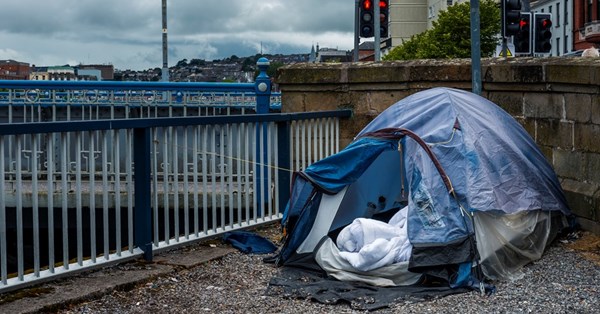
A GROUP of charities supporting rough sleepers have deplored recent comments by the Home Secretary, Suella Braverman, in which she described homelessness as a “lifestyle choice” for some.
On Saturday, Ms Braverman wrote on social media that “The British people are compassionate. We will always support those who are genuinely homeless. But we cannot allow our streets to be taken over by rows of tents occupied by people, many of them from abroad, living on the streets as a lifestyle choice.”
Her comments sparked a backlash online from charities that support homeless people.
On Wednesday afternoon, more than 65 of these organisations signed a joint letter to Ms Braverman raising “serious and unequivocal concerns” about the Government’s failure to fulfil its own manifesto to end rough sleeping by the end of the parliament, despite the increased efforts of the signing organisations to do so. The group had provided emergency accommodation to more than 4000 people last winter, they say.
“It is all the more disappointing then,” their letter continues, “given the progress of partnership working in recent years, to read newspaper headlines from government sources seeking to criminalise homeless charities faced with rising need and finite capacity.”
The letter was due to be delivered at 5 p.m. on Wednesday. Signatories include several Christian and church-led organisations, including Housing Justice.
“Faith and community groups are increasingly concerned by a visible increase in the number of people sleeping out and there will be a range of responses over the coming weeks and months,” they write. “While we agree that giving someone a tent is never a first choice or preferred situation, there must be other available options for people if we do not want to see more tents in our towns and cities.”
The letter concludes: “We want to be clear today, there are currently not enough beds planned nationally to cope with demand. Without further action from the Government, there will be serious consequences, including avoidable deaths.”
This action, it says, would include the Home Office not discharging anyone to homelessness, but allowing time for people to find suitable accommodation; the Chancellor making further charitable funds available in the Autumn Statement for homelessness work; and the Government publishing Operating Principles for night shelters without delay so that “providers have the certainty they need to provide safe accommodation for people experiencing rough sleeping”.
Finally, it says, “rather than criminalising charities handing out tents, the Government should engage proactively through the sector to respond positively to the rough sleeping emergency faced by the country.”
The chief executive of Housing Justice, Kathy Mohan, said: “The focus of every night shelter and provider of emergency accommodation at the moment is rising need: in some places a really worrying level of need and a limited number of beds. Rather than being distracted by some unhelpful rhetoric, we must focus on the very serious situation we are facing this winter.”
Crisis was among those to respond to Ms Braverman’s comments online. The charity said in a statement: “Sleeping on the streets is not a lifestyle choice. We don’t have nearly enough affordable homes & rents are soaring, leaving people destitute and forced to sleep rough. . .
“People sleeping rough often face violence & abuse. The impact on their physical and mental health is significant. The average age of death for people experiencing homelessness is just 45 for men and 43 for women. This is not a life people choose.”
A statement from Maggs Day Centre in Worcestershire — which provides two open-door day centres, a clothing and accommodation project — was re-posted by the Bishop of Worcester, Dr John Inge. It said: “We can confidently say that in our experience of over 30 years of working with homeless people and rough sleepers, living on the streets is not a lifestyle choice.
“The reasons for homelessness are never simple and are usually determined by a range of complex circumstances such as mental ill-health, trauma, fleeing from domestic violence, and so many more complicated personal and social issues. These people find themselves having no option but to sleep in a tent.”
